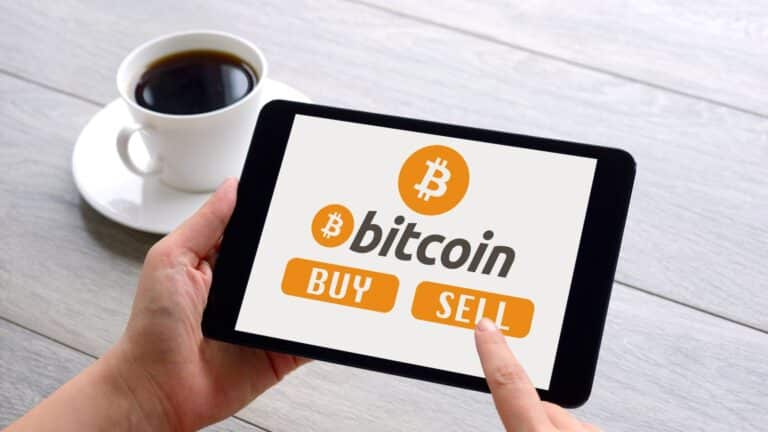A digital wallet is used to store your public and private keys. Public keys are used as wallet addresses so buyers and senders can send coins to personal destinations, ensuring your assets go where they need to go. Private keys are used to access funds and initiate transactions. Your money is secure so long as your private key is kept a secret.
Digital wallets are important for the bitcoin ATM users’ access to their funds. Digital wallets allow crypto owners to store their financial information, send or sell coins, and receive or buy crypto without relying on a third-party banking system.
Your digital wallet will not actually store your coins as a physical wallet would. Instead, your assets exist on a blockchain. While records of your transactions and ownership exist on the blockchain, crypto users must use their private keys to access their funds and make transactions. By using a digital wallet, crypto users can easily manage their digital assets.
When you are buying or selling crypto at a crypto ATM, you will use your wallet’s address to send and receive coins. Having access to your public keys and private keys is crucial for buying and selling crypto at an ATM.
Digital wallets are scanned by the ATM when making a purchase. Digital wallets are also used to scan the QR code provided by the ATM when making a sale. So what is the best digital wallet for a crypto ATM? It depends.
Types of digital wallets include custodial wallets, non-custodial wallets, hot wallets, cold wallets, software wallets, and hardware wallets.
Custodial Wallets
- Custodial wallets operate through third parties (for example, exchanges). Custodial wallets store your keys for you.
Pros of Custodial Wallets
- By using a custodial wallet, users have the ability to restore lost private keys and make quick transactions with low fees.
Cons of Custodial Wallets
- The third party has control over your funds, and custodial wallets can lack security for this reason.
- Withdrawals are slower because of the high volume of transactions being processed by a third party.
Non-Custodial Wallets
- Non-custodial wallets do not store your keys: instead, users are responsible for the security of their keys.
Pros of Non-Custodial Wallets
- Withdrawals are fast.
- Non-custodial wallet users have exclusive access to their keys.
Cons of Non-Custodial Wallets
- Losing a private key is irreversible, and lost access to funds cannot be recovered.
- Transaction fees tend to be higher for non-custodial wallet users.
Hot Wallets
- Hot wallets are connected to the internet.
Pros of Hot Wallets
- Hot wallets are more popular than cold wallets for their convenience and quick access to digital funds.
- Often, hot wallets are free.
Cons of Hot Wallets
- Hackers target hot wallets, and your account’s security can be at risk.
- Sometimes, hot wallets on exchange platforms shut down, and funds are irrecoverable.
Cold Wallets
- Cold wallets are not connected to the internet.
Pros of Cold Wallets
- The most significant benefit of a cold wallet is the added security. Without access to the internet, internet hackers have no way to access your keys or funds.
Cons of Cold Wallets
- Cold wallets are less convenient and require more steps to access funds and sign transactions.
- Transactions are also slower which has the potential to impact investments or trades in crypto’s ever-fluctuating market.
Software Wallets
Software wallets are mobile applications, desktop applications, or browser extensions where users can access their funds and initiate transactions through their phone or computer.
Pros of Software Wallets
- It is very easy to access your funds through your phone or computer.
- There is no need for a third party (like an exchange), so users have complete control over their keys.
Cons of Software Wallets
- These wallets are connected to the internet, so there is a security risk from hackers.
Hardware Wallets
Hardware wallets plug into a device connected to the internet. They allow users to store keys without holding them on an internet-connected device. Instead of an application, these wallets can be USB drives or other plug-in devices.
Pros of Hardware Wallets
- Hardware wallets are extremely secure as access to your funds is offline and safe from internet hackers.
Cons of Hardware Wallets
- If you lose your hardware wallet, access to your digital assets is gone.
Paper Wallets
A paper wallet is a piece of paper with your keys and sometimes a QR code printed on it, so access to funds is completely offline.
Pros of Paper Wallets
- Paper wallets are cheap to print and easy to store.
- Paper wallets are very secure as they are offline and safe from internet hackers.
Cons of Paper Wallets
- Paper wallets cannot store more than one type of crypto because they only provide one public key and one private key.
- Losing a paper wallet puts access to your private keys in anyone’s hands.
To select the wallet that is right for you, decide what kind of crypto you want to buy. You should also consider how secure each wallet is, as hackers are able to steal private keys from digital wallets with weak security.
Different Wallets For Different Cryptocurrencies
Different wallets vary in the type of crypto they support. You should know that software wallets are typically designed to host specific types of cryptocurrencies, while hardware wallets have capabilities to support greater varieties of coins.
Most crypto wallets allow users to access multiple types of crypto. For example, if you own both Bitcoin and Litecoin, you will not always need to store the keys for the different cryptocurrencies in different wallets. If you are going to invest in a high number of different types of coins, then you may find custodial software wallets to be the most efficient type of wallet for you. If you want to be able to access your keys without relying on the internet, then using a cold wallet is going to be important to you. Holding all of your assets in one wallet can be risky, so the option to own more than one wallet makes sense for some investors or traders.
Crypto owners can have different wallets for different currencies if they seek an added layer of security for their keys, but owning a different wallet for every cryptocurrency you buy is not mandatory as most wallets can support multiple coins and keys.
Do You Need A Crypto Wallet To Use A Bitcoin ATM?
You do need a crypto wallet to use a bitcoin ATM. Crypto wallets are crucial to ensuring that the crypto you purchase finds its way to your address, and the crypto you sell finds its way to its buyer.
You should know that private and public keys look like long complicated strings of numbers and letters. It is very difficult to memorize and easy to mess up these keys when inputting them into a crypto ATM. Mobile wallets provide QR codes to ensure that crypto ATMs have the correct data when facilitating transactions.
Before using a bitcoin ATM, download or purchase a wallet that supports the kind of coins you want to buy or sell. The machine will first verify your identity by asking for your phone number and texting you a PIN. The bitcoin ATM will also require your wallet address, which is accessed by scanning the QR code in your wallet. Once you have a wallet with access to your private and public keys, all you need is cash and your phone number to buy bitcoin from the crypto ATM.
Which Crypto Wallet Is Best For Withdrawal?
If you plan to use your wallet for a large number of withdrawals at a bitcoin ATM, be sure that the wallet you select has low transaction fees. Some wallets are free, and others require a percentage from each transaction. You may find some wallets that charge a flat fee for each transaction. The best crypto wallet for withdrawing cash at a crypto ATM is a wallet that supports the coin you are selling and values the security of your keys.
You should know that cash withdrawals require a short processing time: typically, sellers will get a confirmation of their sale in ten minutes to an hour. After the transaction is processed, the ATM will withdraw money for you.
Can You Deposit Cash In An ATM For Crypto?
You can deposit cash at a crypto ATM by purchasing coins at a crypto ATM: To “deposit” cash, you will buy crypto in exchange for cash. Crypto ATMs are a great way to turn your cash into crypto quickly. Most crypto ATMs are cash only, and if you are looking for a convenient and quick way to turn your cash into cryptocurrency, then find a crypto ATM near you.
You should know that not all bitcoin ATMs are capable of completing cash withdrawals. Some bitcoin ATMs allow users to buy and sell bitcoin at their machines, and others limit their users to buying.
Remember:
- If you are buying bitcoin, you will “deposit” cash in exchange for crypto.
- If you are selling bitcoin, you will use your wallet to send coins to a buyer. Crypto ATMs that process sales will alert the seller when their transaction has been processed and their cash is ready to be “withdrawn”.
As you decide which type of mobile wallet is best for your bitcoin ATM needs, you should know that RockItCoin’s digital wallet functions for users looking to buy, sell, or trade bitcoin online or in person at a RockItCoin ATM. By downloading RockItCoin’s app, you can be sure that your keys are safe as our users have complete custody over their private keys. Whether you are withdrawing cash at a crypto ATM or depositing cash at a crypto ATM, RockItCoin’s digital wallet is safe, convenient, and reliable. The RockItCoin digital wallet supports BTC, LTC, ETH, & BCH.
Our ATMs make it easier than ever to buy or sell bitcoin. With over 1,800 locations across the United States, the chances of finding a way to make cash-to-crypto transactions in your neighborhood are growing. To start buying and selling bitcoin with cash, all you need is a digital wallet, your phone number, and cash! To buy or sell crypto for cash at a crypto ATM near you, use RockItCoin’s ATM map.








